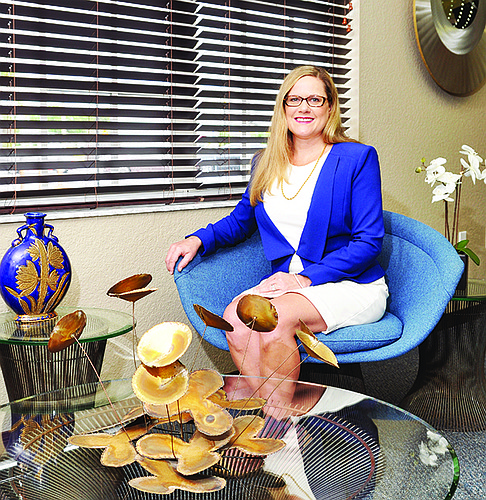- December 20, 2024
-
-
Loading

Loading

A big-city career awaited Jacksonville native Jill McCrory in 2003, right after she earned her tax law degree from the University of Florida.
Then she hit a detour: The Farr Law Firm, in tiny Punta Gorda, recruited McCrory. She would be the only attorney in town to specialize in tax law. McCrory paused. “I had never heard of Punta Gorda at all, and I didn't know much about Charlotte County,” McCrory says. “But I fell in love with it here.”
Now, a little more than a decade later, McCrory has her own practice in Punta Gorda, the McCrory Law Firm. The firm, which handles everything from wills to family law to zoning regulations, has grown rapidly since McCrory founded it in a 1,100-square-foot office in 2009, at the peak of the recession. “I never thought I would open my own firm,” says McCrory. “I was so scared.”
The practice has six attorneys, 12 paralegals and is based out of its own building on U.S. 41 in newly revitalized downtown Punta Gorda. The firm is now the second largest in Charlotte County, in total attorneys, behind the Farr Law Firm. The University of Florida also recently recognized McCrory's growth: The firm placed 38th on UF's inaugural Gator100 list, a ranking of the fastest-growing firms run or owned by alumni. Revenues, on a compound annual growth rate, are up 50% at the firm since 2011, the list shows. McCrory declines to release specific figures.
Some of the growth stems from the mini building boom in Punta Gorda. The firm's zoning and land use work has doubled over the last year, says McCrory, with new hotels, restaurants and medical practices leading the development resurgence. An influx of retirees moving to town has also led to more work in wills, trusts and estate planning. “People in Charlotte County used to go to Sarasota and Fort Myers for professional services,” says McCrory, “but that's changed.”
The recent success also comes from a pair of internal factors. One is the unusual pay structure of the firm: There are no billable hours. That billable-hour model, McCrory says, leads to client distrust and overworked attorneys with misguided priorities. “That's when you see clients as a bill, not a person,” says McCrory. “Your life becomes not the work for the client, but watching a clock.”
The firm, instead, charges flat fees per transaction or activity. It's a model some law firms have adopted over the last few years against steep competition from other practices and non-law firm services like LegalZoom.com. Dumping the billable hours model not only aids client retention, says McCrory, but it also helps employee morale because attorneys don't chase a fat paycheck.
A second reason for the growth, McCrory says, is her notoriety around town. She's on the board that oversees Bayfront Health, a 208-bed hospital, and she volunteers for Team Punta Gorda, an organization created to help rebuild the community after Hurricane Charley in 2004. McCrory also participates annually in the Dancing with the Charlotte Stars, an Arts & Humanities Council of Charlotte County fundraiser. “In Charlotte County, the more involved you are,” says McCrory, “the more they support you right back.”
McCrory says her work in the community, combined with the non-billable hours, allows her to have one more thing rather uncommon in the legal profession: low blood pressure. “All of the attorneys here are super happy,” says McCrory. “And we have room to grow. If I can surround myself with like-minded people, I will hire 1,000 lawyers.”
Follow Mark Gordon on Twitter @markigordon